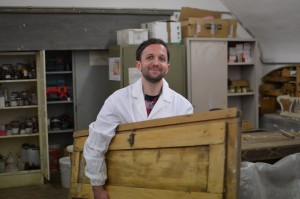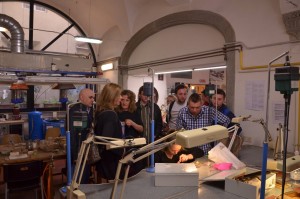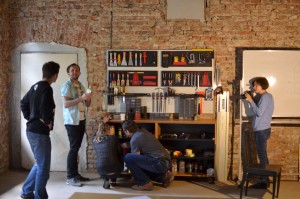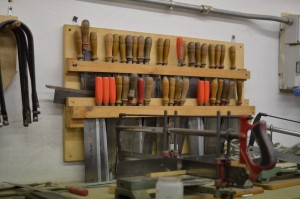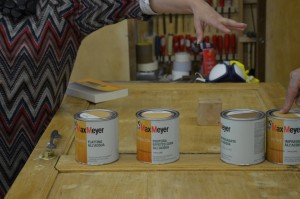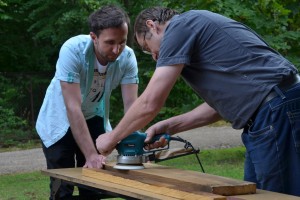Get experience
Experience is essential to launch a successful venture. We mean here experience in the specific field in which you are going to operate. Nowadays all vocational education establishments, including universities, seek ways to provide experiential learning opportunities to their students. The form of support varies from apprenticeships to entrepreneurship incubators in which the participants can practise and acquire a wider range of competencies beyond purely technical skills. Unfortunately, such incubators preparing young people for setting up their own ventures still tend to be rare in many countries. They are best developed in the IT sector where they have fostered many successful start-ups.
It is very likely that you, as a young craftsman, didn’t have such an opportunity. You might have participated in practical workshops at school or worked as an apprentice. However such experience substantially differs from a situation where it is you who have to initiate a course of action, come up with an idea what service to offer, how to organise your workshop, supply it with tools and materials, approach customers, negotiate contracts and be responsible for delivering the work. And these are just examples of the tasks that you will be facing if you decide to go freelance and become an entrepreneur rather than a hired worker. The question is how to learn all the needed skills in practice – reading or just talking will not get you much forward.
In this module we would like to bring your attention to a phenomenon which may inspire you to join or create a collaborative learning space in which to practice a much wider range of skills than those which can be acquired in a school workshop. So called ‘maker spaces’ which are rapidly spreading in various localities around the world bring together craftsmen, entrepreneurs and everyday citizens who come together to experiment with new tools and techniques, learn vital skills in technology and craft, and launch innovative businesses. This movement gives a new dimension to traditional craft. There are many examples of such maker spaces in which young people get artisanal practice in an environment distinct from a typical school workshop.
You might not find a maker space in your area fitting your particular interests in craft. But you may know people you would like to work with, whose expertise you value and whose company you enjoy. Collaboration with them may bring a number of benefits before you decide to venture into business as a sole proprietor or a business partner. You can begin with hands-on projects together in a shared space offering a learning experience to all those involved.
In the particular field of woodwork renovation setting up a workshop is a relatively easy task. Organising such a workshop environment in a company of others is both enjoyable and profitable. The space can offer opportunities for meetings, discussions, planning and creating things together. The benefits you may derive from the shared efforts relate to the fact that you need minimal investment to organise the workshop as all the ‘stakeholders’ are bringing something to the enterprise, in terms of contributed resources, invested time, shared expertise, etc. As a result you may be able to create your own maker space of a distinct identity, hosting a small ‘community of practice’ around a set of shared tasks.
The workshop needs to be tooled up properly if to allow you take on renovation orders. As in the case of organising the maker space you need to set realistic tasks and not be discouraged by the fact that some of the equipment may be beyond your reach in the beginning. Woodwork renovators still do a lot of work with traditional tools and they can be purchased with relatively low investment. The advantage of a maker space is that you can share the tools with others, not necessarily buy everything yourself. At a certain point you will need to equip your workshop with state-of-the-art machinery but it is advisable to postpone the decision till the moment when you have a feasible plan for your business development. First make sure that you can make profit on your services before you start buying expensive hardware.
Getting materials for pilot renovation tasks can be an excellent exercise in resourcing your workshop. You will need both relatively low-cost stuff and more expensive specialist paints, varnishes, veneer, etc. Check prices at local suppliers and compare them with those offered by online shops. Make a careful calculation of what you exactly need for a particular task and try to budget the whole project. Each following order will be easier both in terms of budgeting and because of the fact that some stuff will stay over from previous works. Only in the process of supplying your workshop you will get a clear idea of the costs involved. It is very likely that this will be a new experience to you as compared with school or apprenticeship where everything is usually already provided and ready to use.
These tasks need to be realistic and well chosen not to put you in a situation in which you may be unable to deliver what you are expected to or the quality of the delivered service might be much below expectations. Getting experience has an inherent risk of failing so it is not a good idea to start with experiments on historic objects of value without trials on less precious items. A company of an experienced craftsman may help you minimise the risks. And this is another benefit of a maker space: many such environments bring together learners and very skilful craftsmen who enjoy sharing their expertise with younger colleagues.
Let’s consider a concrete example to illustrate the above point: an old door to an old building, left to deteriorate for a long time, still with a potential to regain its original splendour. The owner is willing to let you renovate it but for obvious reasons wants to be involved in the whole process to avoid unexpected results. This is a perfect case of experiential learning of renovation in which you will have to go through the whole process of negotiating the order, planning interventions on the wooden substance, supervision of the client and final validation of your work. If the whole process leads to satisfactory results, both to the client and you as a service provider, you may get an encouragement to continue with following orders, thus gradually building your reputation as a skilful and reliable craftsman.
